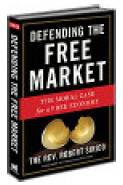|
|
|
Leftists have never been fans of capitalism. But in this election year when so much hinged on our floundering economy, President Obama and his allies launched a full-throttle campaign to discredit the free market. The general outline of their argument goes something like this: Capitalism doesn't work - but even if it does, it's selfish, greedy and cruel. While there are many people who can explain why free markets are efficient and effective, there are far fewer who are equipped to make a moral case for capitalism. With the conviction of a convert, Robert Sirico has answered that call with his new book, Defending the Free Market: The Moral Case for a Free Economy. Using homey stories from his youth in the Bronx, current events, and relevant findings from scholarly works, Sirico explains why free markets respect the dignity and meet the needs of people better than government bureaucracies ever could. He also makes good use of his own former Leftist misconceptions, including an assertion he made in the '70s, now repeated verbatim by the Occupy Wall Street movement. Concerned that "the rich" owned a disproportionate share of the world's wealth, Sirico suggested to a conservative friend that poverty could end if there was an "immediate and aggressive redistribution -- of the top 1 percent's wealth to everyone else. (In today's dollars, that would amount to a one-time $13,000 windfall for every person on the planet.) His friend conceded that the poor would benefit as consumers in the short term, but then asked, "Where would people work once all the wealth of the richest 1 percent was redistributed?" A light went on for Sirico as he realized that if the rich have no money to invest and produce, the infrastructure that provides products, services and jobs for all of us would fall apart. This anecdote is but one of the many gems in the book. One recurring theme is that proponents of the welfare state actually dishonor the poor by viewing them as less than human -- as mere "mouths to feed" rather than "makers" with creativity, energy and potential. Both anecdotes and research show that people thrive when given opportunity and responsibility instead of simple handouts. Sirico also tackles many other Leftist assumptions and talking points about greed, social justice, healthcare and the environment. Though agnostics and atheists may not agree with the Christian faith that underpins Sirico's moral case for capitalism, everyone who cares about human flourishing should find ample reasons to appreciate his arguments. (Regnery Publishing, 2012, 212 pp., $28) |
 A former Leftist himself, Sirico once spent his time "sitting in" for the cause du jour and campaigning with Jane Fonda and her then husband Tom Hayden. Now a Catholic priest and co-founder of the Acton Institute, Sirico answers the most common charges against capitalism with both sound economics and the moral authority of someone who has devoted his career to serving the needy. He also makes his case with the humility of someone who used to believe the very same things he is now refuting.
A former Leftist himself, Sirico once spent his time "sitting in" for the cause du jour and campaigning with Jane Fonda and her then husband Tom Hayden. Now a Catholic priest and co-founder of the Acton Institute, Sirico answers the most common charges against capitalism with both sound economics and the moral authority of someone who has devoted his career to serving the needy. He also makes his case with the humility of someone who used to believe the very same things he is now refuting.

